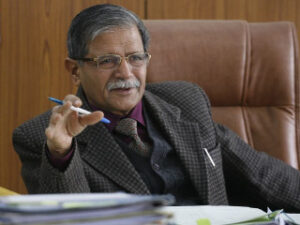Khul Ke, India’s homegrown social media platform launched by Loktantra Mediatech Pvt. Ltd. The platform brings forth powerful voices from across the country to share their thoughts on relevant issues and topics impacting the nation or share stories of their remarkable personal achievements in the face of adversity.
The legal maxim “Justice delayed is justice denied” can be completely related to the present scenario of our country. According to the reports presently there are 4.7 crores pending cases in India.
A court is a place where a person no matter which caste or religion is assured of getting justice.
During the RoundTable hosted on a new social media and conversations platform Khul Ke, for the episodic series Tareekh Pe Tareekh, Pradeep Rai, Senior Advocate & Vice President, Supreme Court Bar Association, said that “Mai yeh manta hu ki humara jo system hain ussme bohat sari khamiyaan hai, aur yeh khamiyaan isliye hai, humne copy ki UK ke system ko, wahan pe unki abadhi kum hai, unka revenue system bohot zyada hai.”
Pradeep Rai further spoke about the importance of court recordings being accessible to the common man on popular social media platforms. He said, “Lekin mai phir bhi yeh kehta hu ki jaha kahi ke bhi bar ho aap ki jo dayeek prakriya hai ki puri ki puri recorded honi chahiye, isko YouTube pe dala jaana chahiye.”
Indian Judiciary is always known for its right and fair judgment. But what if the person has to wait for a longer period just to attain justice? Will that delayed judgment make any remarkable change in the life of the victim?
In this context, Justice S. N. Dhingra, Former Judge, Delhi High Court said that “Sabse badi baat yeah hain ki judge ko jo gareeb aadmi hai usski kathinaye pata nahi aur isiliye log apna mukhadma beech mai chod ke jaarahe hain.”

S.N Dhingra, renowned for his landmark judgements on the 1984 anti-Sikh riots and Robert Vadra land deal case, further added, “Humara pura system jo hai, jisme yeh ho raha hai ki aam aadmi ko nyay nahi mil pa raha, uski sabse badi zimmdari judgeo ke upar hi hai. Judge jo hai aapne court ka master hota hai, agar who court theek nahi chalata tho uske liye doshi aap kisko man sakte hai?”
N Dhingra added, “Tareekh delay hone ka bohot bada kaaran yeh hai ki aaj humare adaalate vakeel run kar rahe hain.”
As we know, the Indian judiciary stands as an ideal pillar for people not only for the enforcement of laws but also for providing justice to each victim. After 75 years of independence, can India truly count on the judicial system to work on reasonable timelines?
